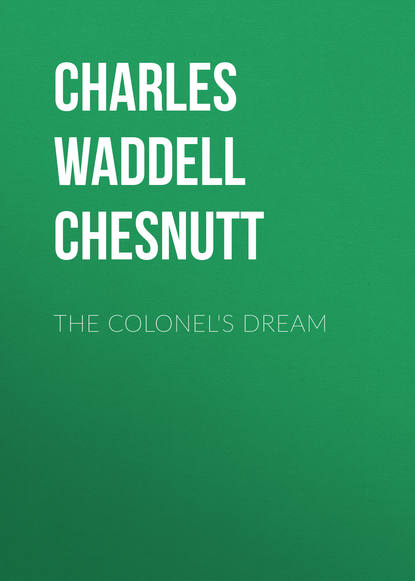По всем вопросам обращайтесь на: info@litportal.ru
(©) 2003-2024.
✖
The Colonel's Dream
Настройки чтения
Размер шрифта
Высота строк
Поля
Miss Laura handed him a thin, oblong, yellowish slip of paper, which had been folded in the middle; it was a printed form, upon which several words had been filled in with a pen.
"It was enclosed in this," she said, handing him another paper.
The colonel took the papers and glanced over them.
"Mother thinks," said Miss Laura anxiously, "that they are the papers we were looking for, that prove that Fetters was in father's debt."
The colonel had been thinking rapidly. The papers were, indeed, a promissory note from Fetters to Mr. Treadwell, and a contract and memorandum of certain joint transactions in turpentine and cotton futures. The note was dated twenty years back. Had it been produced at the time of Mr. Treadwell's death, it would not have been difficult to collect, and would have meant to his survivors the difference between poverty and financial independence. Now it was barred by the lapse of time.
Miss Laura was waiting in eager expectation. Outwardly calm, her eyes were bright, her cheeks were glowing, her bosom rose and fell excitedly. Could he tell her that this seemingly fortunate accident was merely the irony of fate—a mere cruel reminder of a former misfortune? No, she could not believe it!
"It has made me happy, Henry," she said, while he still kept his eyes bent on the papers to conceal his perplexity, "it has made me very happy to think that I may not come to you empty-handed."
"Dear woman," he thought, "you shall not. If the note is not good, it shall be made good."
"Laura," he said aloud, "I am no lawyer, but Caxton shall look at these to-day, and I shall be very much mistaken if they do not bring you a considerable sum of money. Say nothing about them, however, until Caxton reports. He will be here to see me to-day and by to-morrow you shall have his opinion."
Miss Laura went away with a radiantly hopeful face, and as she and Graciella went down the street, the colonel noted that her step was scarcely less springy than her niece's. It was worth the amount of Fetters's old note to make her happy; and since he meant to give her all that she might want, what better way than to do it by means of this bit of worthless paper? It would be a harmless deception, and it would save the pride of three gentlewomen, with whom pride was not a disease, to poison and scorch and blister, but an inspiration to courtesy, and kindness, and right living. Such a pride was worth cherishing even at a sacrifice, which was, after all, no sacrifice.
He had already sent word to Caxton of his accident, requesting him to call at the house on other business. Caxton came in the afternoon, and when the matter concerning which he had come had been disposed of, Colonel French produced Fetters's note.
"Caxton," he said, "I wish to pay this note and let it seem to have come from Fetters."
Caxton looked at the note.
"Why should you pay it?" he asked. "I mean," he added, noting a change in the colonel's expression, "why shouldn't Fetters pay it?"
"Because it is outlawed," he replied, "and we could hardly expect him to pay for anything he didn't have to pay. The statute of limitations runs against it after fifteen years—and it's older than that, much older than that."
Caxton made a rapid mental calculation.
"That is the law in New York," he said, "but here the statute doesn't begin to run for twenty years. The twenty years for which this note was given expires to-day."
"Then it is good?" demanded the colonel, looking at his watch.
"It is good," said Caxton, "provided there is no defence to it except the statute, and provided I can file a petition on it in the county clerk's office by four o'clock, the time at which the office closes. It is now twenty minutes of four."
"Can you make it?"
"I'll try."
Caxton, since his acquaintance with Colonel French, had learned something more about the value of half an hour than he had ever before appreciated, and here was an opportunity to test his knowledge. He literally ran the quarter of a mile that lay between the colonel's residence and the court house, to the open-eyed astonishment of those whom he passed, some of whom wondered whether he were crazy, and others whether he had committed a crime. He dashed into the clerk's office, seized a pen, and the first piece of paper handy, and began to write a petition. The clerk had stepped into the hall, and when he came leisurely in at three minutes to four, Caxton discovered that he had written his petition on the back of a blank marriage license. He folded it, ran his pen through the printed matter, endorsed it, "Estate of Treadwell vs. Fetters," signed it with the name of Ellen Treadwell, as executrix, by himself as her attorney, swore to it before the clerk, and handed it to that official, who raised his eyebrows as soon as he saw the endorsement.
"Now, Mr. Munroe," said Caxton, "if you'll enter that on the docket, now, as of to-day, I'll be obliged to you. I'd rather have the transaction all finished up while I wait. Your fee needn't wait the termination of the suit. I'll pay it now and take a receipt for it."
The clerk whistled to himself as he read the petition in order to make the entry.
"That's an old-timer," he said. "It'll make the old man cuss."
"Yes," said Caxton. "Do me a favour, and don't say anything about it for a day or two. I don't think the suit will ever come to trial."
Thirty-one
On the day following these events, the colonel, on the arm of old Peter, hobbled out upon his front porch, and seating himself in a big rocking chair, in front of which a cushion had been adjusted for his injured ankle, composed himself to read some arrears of mail which had come in the day before, and over which he had only glanced casually. When he was comfortably settled, Peter and Phil walked down the steps, upon the lowest of which they seated themselves. The colonel had scarcely begun to read before he called to the old man.
"Peter," he said, "I wish you'd go upstairs, and look in my room, and bring me a couple of light-coloured cigars from the box on my bureau—the mild ones, you know, Peter."
"Yas, suh, I knows, suh, de mil' ones, dem wid de gol' ban's 'roun' 'em. Now you stay right hyuh, chile, till Peter come back."
Peter came up the steps and disappeared in the doorway.
The colonel opened a letter from Kirby, in which that energetic and versatile gentleman assured the colonel that he had evolved a great scheme, in which there were millions for those who would go into it. He had already interested Mrs. Jerviss, who had stated she would be governed by what the colonel did in the matter. The letter went into some detail upon this subject, and then drifted off into club and social gossip. Several of the colonel's friends had inquired particularly about him. One had regretted the loss to their whist table. Another wanted the refusal of his box at the opera, if he were not coming back for the winter.
"I think you're missed in a certain quarter, old fellow. I know a lady who would be more than delighted to see you. I am invited to her house to dinner, ostensibly to talk about our scheme, in reality to talk about you.
"But this is all by the way. The business is the thing. Take my proposition under advisement. We all made money together before; we can make it again. My option has ten days to run. Wire me before it is up what reply to make. I know what you'll say, but I want your 'ipse dixit.'"
The colonel knew too what his reply would be, and that it would be very different from Kirby's anticipation. He would write it, he thought, next day, so that Kirby should not be kept in suspense, or so that he might have time to enlist other capital in the enterprise. The colonel felt really sorry to disappoint his good friends. He would write and inform Kirby of his plans, including that of his approaching marriage.
He had folded the letter and laid it down, and had picked up a newspaper, when Peter returned with the cigars and a box of matches.
"Mars Henry?" he asked, "w'at's gone wid de chile?"
"Phil?" replied the colonel, looking toward the step, from which the boy had disappeared. "I suppose he went round the house."
"Mars Phil! O Mars Phil!" called the old man.
There was no reply.
Peter looked round the corner of the house, but Phil was nowhere visible. The old man went round to the back yard, and called again, but did not find the child.
"I hyuhs de train comin'; I 'spec's he's gone up ter de railroad track," he said, when he had returned to the front of the house. "I'll run up dere an' fetch 'im back."
"Yes, do, Peter," returned the colonel. "He's probably all right, but you'd better see about him."
Little Phil, seeing his father absorbed in the newspaper, and not wishing to disturb him, had amused himself by going to the gate and looking down the street toward the railroad track. He had been doing this scarcely a moment, when he saw a black cat come out of a neighbour's gate and go down the street.
Phil instantly recalled Uncle Peter's story of the black cat. Perhaps this was the same one!
Phil had often been warned about the railroad.
"Keep 'way f'm dat railroad track, honey," the old man had repeated more than once. "It's as dange'ous as a gun, and a gun is dange'ous widout lock, stock, er bairl: I knowed a man oncet w'at beat 'is wife ter def wid a ramrod, an' wuz hung fer it in a' ole fiel' down by de ha'nted house. Dat gun couldn't hol' powder ner shot, but was dange'ous 'nuff ter kill two folks. So you jes' better keep 'way f'm dat railroad track, chile."
But Phil was a child, with the making of a man, and the wisest of men sometimes forget. For the moment Phil saw nothing but the cat, and wished for nothing more than to talk to it.
So Phil, unperceived by the colonel, set out to overtake the black cat. The cat seemed in no hurry, and Phil had very nearly caught up with him—or her, as the case might be—when the black cat, having reached the railroad siding, walked under a flat car which stood there, and leaping to one of the truck bars, composed itself, presumably for a nap. In order to get close enough to the cat for conversational purposes, Phil stooped under the overhanging end of the car, and kneeled down beside the truck.
"Kitty, Kitty!" he called, invitingly.










